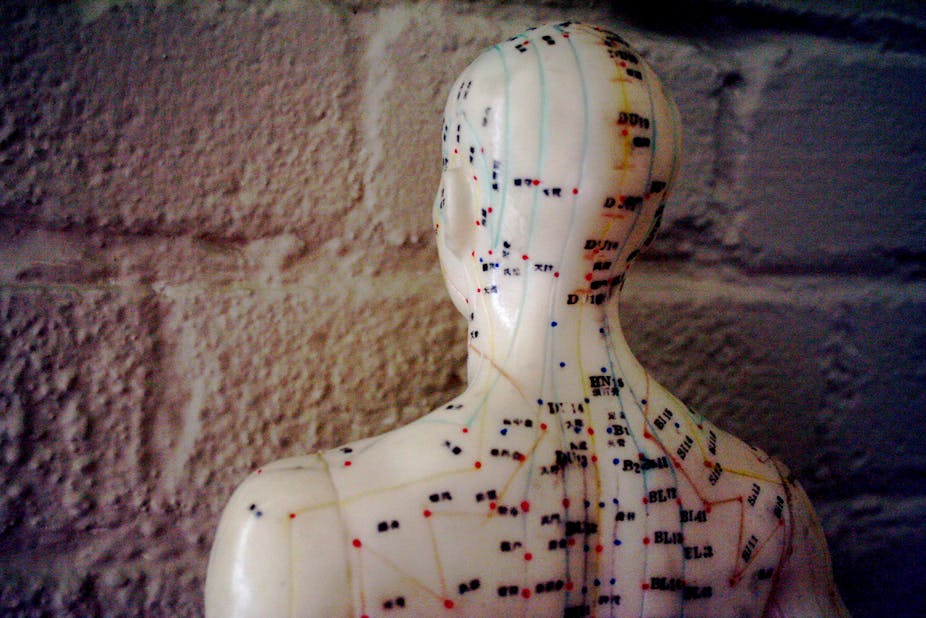Acupuncture is popular and no doubt lucrative for its practitioners. The fact that it doesn’t work seems to be of little relevance, and certainly has not curbed enthusiasm for the application of what is, in effect, a superb placebo.
Practitioners of traditional Chinese medicine seem culturally locked into an unshakeable belief in the pre-scientific concepts of a non-existent vital force (Ch’i) transmitted along meridians which, when blocked or imbalanced, cause disease. Trigger spots for acupuncture to correct these problems are said to lie along the meridians.
For anyone who believes that the appropriate standard for modern medicine should be credible scientific evidence of clinical effectiveness, it’s disturbing that so many doctors, trained to understand scientific method, are embracing the technique. It’s not a situation where doctors using acupuncture say, “Well the Chinese theories may be nonsensical but the technique actually works for unknown reasons and is effective in a large number of conditions.”
Acupuncture has been subjected to extensive scientific analysis, particularly in the last decade. Its ability to help with some forms of neck pain is the only benefit that has support from good science and that turns out to have nothing to do with meridian lines, mysterious forces or any of the other mystical propositions cited in support of acupuncture.
Last year a review of all published studies in the last ten years examining the effectiveness of acupuncture appeared in the prestigious journal, Pain.

An editorial in the same issue featured the headline “Acupuncture’s claims punctured: Not proven effective for pain, not harmless”. The journal recommended that physicians tell patients “although some patients believe that it has helped them, the evidence does not show that it (acupuncture) works any better than placebo”.
So it’s somewhat humorous - if it weren’t symptomatic of the broader problem of the infiltration of pseudoscience into health care in Australia – that doctors and complementary medicine practitioners (particularly traditional Chinese medicine practitioners) are at loggerheads over who can use the title acupuncturist.
This month will see the birth of the Chinese Medicine Board of Australia and it will require practitioners to have completed a three- to four-year accredited course in acupuncture before they can use the title. Under a proposal from the Medical Board of Australia however, doctors who can prove they’ve been performing acupuncture regularly should be able to use the title under “grandfathering” arrangements. In the future, doctors will need a ten-month course to claim the title.
I am one of the founding members of Friends of Science in Medicine (FSM), which was established to help minimise the amount of health-related anti-science foisted on poorly protected consumers, and to emphasise the importance of models of care that provide patients with interventions supported by scientific evidence of effectiveness.
Private health insurers are one of our targets because they’ve been subsidising the cost of so called “complementary and alternative medicine” (CAM) practices, including acupuncture. And by doing this, they’re giving totally undeserved credibility to many such practices.

FSM was heartened when the government announced that, in the future, taxpayer dollars subsidising private health insurance would not be available for CAM activities unless the chief health officer confirmed that there was “credible scientific evidence of their clinical effectiveness”. He has been given a year to reach his conclusions.
But we were disheartened when it was announced that acupuncture and chiropractic would be excluded from the practices to be reviewed. They were not included because there will soon be national registration process for practitioners of traditional Chinese medicine, which would include acupuncturists, and there already is a national registration board for chiropractors. Both are charged with upholding appropriate standards.
This is unsatisfactory because some of the worst offerings of pseudoscience are provided by chiropractors who believe in the “subluxation” theories of their founder (invoking yet another mystical, undefinable and undetectable force), and who are trying to become major players in the delivery of primary care, especially to children.
Chiropractors sympathetic to this nonsense are on the national registration board and executive of the Chiropractic Association of Australia. Similarly, the newly-formed Chinese Medicine Board of Australia is not going to tell Australians that, while acupuncture may be worthy of continuing scientific research, at the moment there is no evidence to support its current use for a wide range of conditions.
FSM has written to all the private health insurers in Australia urging them to abide by the umpire’s decision. All practices that the government finds to be unworthy of taxpayer support should also be unworthy of privately provided insurance dollars. And battles about who can use what title are merely a distraction.

